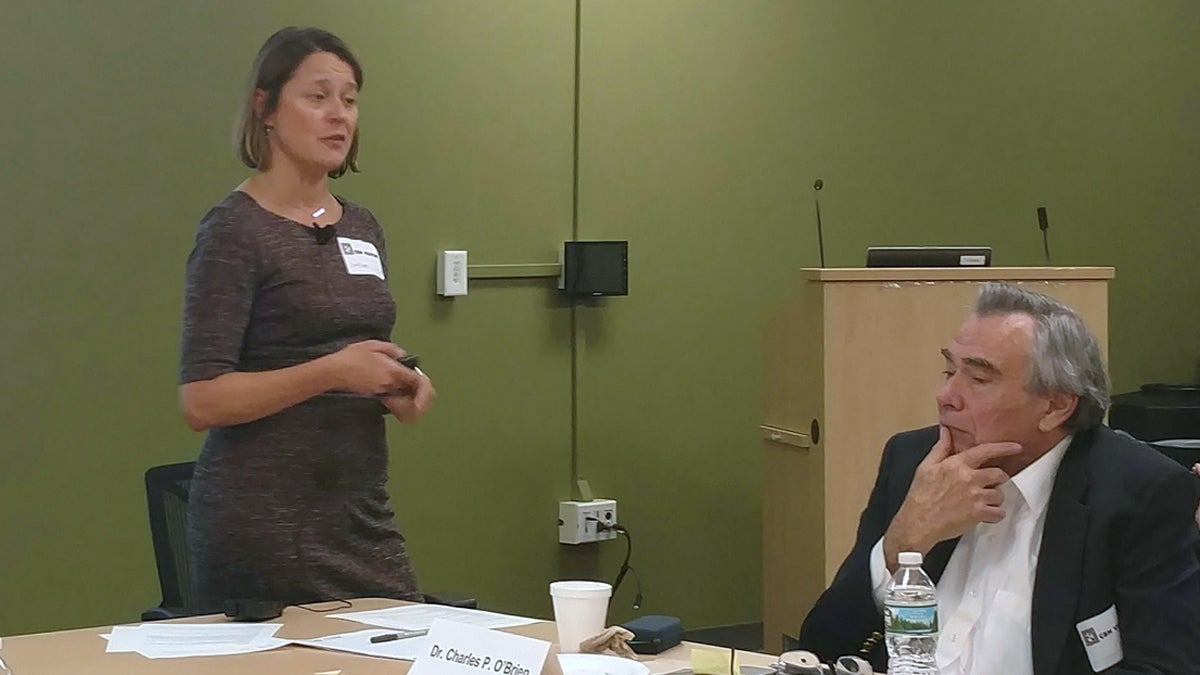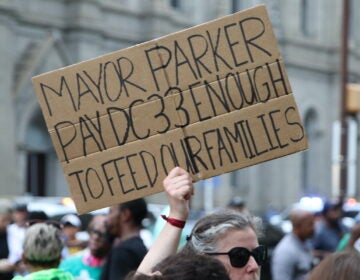Philadelphia’s opioid task force considers ‘safe injection sites’ for drug users
Listen
Sarah Evans, a senior program officer at the Open Society Foundations, speaks to Philadelphia's opioid task force in March 2017 about Vancouver's safe injection site. (Katie Colaneri/WHYY)
A city task force is considering a recommendation that Philadelphia create a site where people can legally use heroin.
It’s among a raft of recommendations attempting to deal with the city’s opioid crisis, which last year claimed more than 900 lives.
“The goal isn’t to teach people how to use drugs,” said Dr. Caroline Johnson, the city’s deputy health commissioner. “They’re intended to be sites to help people and prevent death.”
Johnson is chair of the subcommittee on overdose prevention and harm reduction, which made the recommendation to create one or more “comprehensive user engagement sites” or CUES during a task force meeting Wednesday.
More commonly referred to as “safe” or “supervised injection sites,” the idea is to provide a facility where drug users can also find clean needles, medical care and paths to addiction treatment. There are more than 100 such sites around the world. In January, officials in Seattle approved two of them, becoming the first U.S. city to do so.
Recovery specialist Devin Reaves is a member of Philadelphia’s opioid task force who has been urging the group to go this route, along with a group of community activists. He argues it is the best way help the city’s most vulnerable addicts, especially those who are not yet ready to seek treatment for substance abuse.
“People that we’re not reaching currently, people that are hiding in the shadows,” he said. “Let’s bring them out of the shadows. Let’s get a social worker for them. Let’s get a peer in front of them that says, ‘Hey, there’s another way to live.'”
But the group acknowledges there will be challenges in taking the CUES from a recommendation to reality. The biggest barriers, Johnson said, will be selling the idea to the public, followed by hammering out potential legal issues.
Indeed, two law enforcement representatives on the task force raised questions about whether it could lead to increased drug sales in the area.
Jeremiah Daley, executive director of the Philadelphia/Camden High Intensity Drug Trafficking Area, said any attempts to improve quality of life in hotspot neighborhoods such as Kensington “need to hinge on public safety.”
Sarah Evans is a senior program officer at the Open Society Foundations, but, for eight years, she was involved in running a supervised injection facility in Vancouver called Insite.
Evans told members of Philadelphia’s opioid task force Wednesday that despite more than 3.5 million injections on the site since it opened in 2003, there has never been a single overdose death, nor has crime or drug trafficking increased in the neighborhood.
“In fact, what it does is move the existing drug use scene out of hotel rooms, out of McDonald’s bathrooms, out of back alleys and into a place where people can access the care that they need,” she said.
Evans said visitors do not purchase or deal drugs at Insite, but are invited to bring their own, however they’ve been obtained, to use in private booths with clean syringes that are safely disposed of afterwards.
That’s resulted in reduced rates of HIV and hepatitis C and and an uptick in the number of people seeking help, she said.
“After the injection site open, there was a huge demand for detox and treatment services,” Evans said.
The “comprehensive user engagement sites” are one of more than 20 recommendations the task force is considering, including ways to expand access to treatment and the opioid antidote naloxone, as well as a public information campaign to fight the stigma of addiction.
The group will deliver a final report to Mayor Jim Kenney’s office later this spring.
WHYY is your source for fact-based, in-depth journalism and information. As a nonprofit organization, we rely on financial support from readers like you. Please give today.




